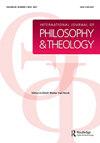多元性理论:物质与形而上学纠缠的哲学与神学概念
IF 0.3
0 PHILOSOPHY
International Journal of Philosophy and Theology
Pub Date : 2022-05-27
DOI:10.1080/21692327.2022.2120530
引用次数: 0
摘要
哲学和神学对差异和关系的处理往往局限于物质形而上学和超越因果关系的传统话语边界。多重性理论避开了对宇宙学机制中的物质和理论投资进行分类的历史愿望,用物质关注和沉浸在差异中的内在本体论和关系本体论进行实验。追溯多样性的出现及其在哲学和神学领域的理论化,我从亨利·柏格森和阿尔弗雷德·诺斯·怀特黑德在概念上意义重大的世纪之交作品开始。注意到Bergson和Whitehead对Gilles Deleuze的深刻影响,我考察了Deleuze个人作品以及他与Felix Guattari合作作品中多样性的出现和发展。在最近的多重神学理论中寻求共鸣,我发现怀特黑德和德勒兹分别是凯瑟琳·凯勒和劳蕾尔·施奈德提出的关系神学和化身神学的重要对话者。我建议凯勒和施奈德都借鉴多样性理论,探索作为本体论姿态的内在性和相互依存性。我的结论是,在哲学和神学话语中,多样性的概念为复杂差异和关系的替代理论提供了资源。本文章由计算机程序翻译,如有差异,请以英文原文为准。
Theories of multiplicity: philosophical and theological conceptions of material and metaphysical entanglement
ABSTRACT Philosophical and theological treatments of difference and relation are often limited to traditional discursive boundaries of substance metaphysics and transcendent causality. Eschewing the historic desire to categorize substance and doctrinal investments in cosmological mechanism, multiplicity theory experiments with immanent and relational ontologies that are materially attentive and immersed in difference. Tracing the emergence of multiplicity and its theorizing across philosophical and theological registers, I begin with Henri Bergson and Alfred North Whitehead’s conceptually significant turn of the century work. Noting both Bergson and Whitehead’s profound influence on Gilles Deleuze, I examine the appearance and development of multiplicity in Deleuze’s individual writings and his collaborative work with Felix Guattari. Seeking resonances in the more recently theological theorizations of multiplicity, I find that Whitehead and Deleuze surface as vital interlocutors for the relational and incarnational theologies put forth, respectively, by Catherine Keller and Laurel Schneider. Each concerned with theological formulations of embodied difference and divine relation, I suggest that both Keller and Schneider draw on theories of multiplicity to explore immanence and interdependence as ontological postures. I conclude that across philosophical and theological discourse diverse conceptions of multiplicity offer resources for alternative theorizations of complex difference and relation.
求助全文
通过发布文献求助,成功后即可免费获取论文全文。
去求助
来源期刊

International Journal of Philosophy and Theology
PHILOSOPHY-
CiteScore
0.30
自引率
0.00%
发文量
12
期刊介绍:
International Journal of Philosophy and Theology publishes scholarly articles and reviews that concern the intersection between philosophy and theology. It aims to stimulate the creative discussion between various traditions, for example the analytical and the continental traditions. Articles should exhibit high-level scholarship but should be readable for those coming from other philosophical traditions. Fields of interest are: philosophy, especially philosophy of religion, metaphysics, and philosophical ethics, and systematic theology, for example fundamental theology, dogmatic and moral theology. Contributions focusing on the history of these disciplines are also welcome, especially when they are relevant to contemporary discussions.
 求助内容:
求助内容: 应助结果提醒方式:
应助结果提醒方式:


